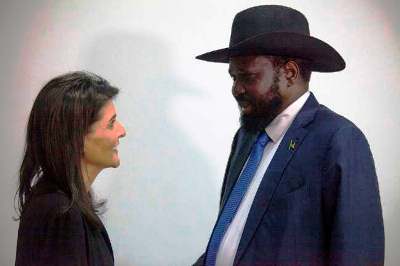U.S. targets South Sudan’s oil entities over civil war
March 21, 2018 (NEW YORK/JUBA) – The United States is targeting South Sudan’s state-owned oil company (Nilepet), its Petroleum and Mining ministries and several other oil-related entities in a move, it says, aims halting the flow of funds used to finance the ongoing civil war.

The move, it explained, would now mean U.S., as well as non-US companies, will now need a license to export, re-export, or transfer exports of any US-origin goods or technology to the listed entities.
“By placing these entities on the U.S. Department of Commerce’s Entity List, the United States will impose a license requirement on all exports, re-exports, and transfers of any U.S.-origin items to those entities,” said US Department spokeswoman, Heather Nauert in a statement.
“We call on the region and broader international community to join us in limiting the financial flows that fuel the continuing violence in the country,” she added.
The US Bureau of Industry and Security, Commerce added the following fifteen entities to a sanction list; Ascom Sudd Operating Company; Dar Petroleum Operating Company; DietsmannNile; Greater Pioneer Operating Co.Ltd; Juba Petrotech Technical Services Ltd; Nile Delta Petroleum Company; Nile Drilling and Services Company; Nile Petroleum Corporation; Nyakek and Sons; Oranto Petroleum; Safinat Group; SIPET Engineering and Consultancy Services; South Sudan Ministry of Minning; South Sudan Ministry of Petroleum and Sudd Petroleum Operating Co.
These entities are reasonably believed to be involved or to pose a significant risk of being or becoming involved, in activities contrary to the national security or foreign policy interests of the US.
South Sudan’s information minister said Wednesday that Washington “is trying to destroy South Sudan’s economy and shut down the oil”.
“It’s an attempt to oust the government because they know our only source of revenue is oil,” Michael Makuei told The Associated Press.
Early this month, The Sentry, an investigative initiative co-founded by George Clooney and John Prendergast, accused South Sudan’s elites of using the nation’s oil wealth to get rich and terrorize civilians.
The report details how revenues from oil resources, the country’s main resources of revenue, are used to fuel militias and ongoing atrocities, and how a small clique continues to get richer while the majority of South Sudanese suffer or flee their homes due to conflict.
According to The Sentry’s investigations, Nilepet has been “captured by predatory elites” and is being used to fund the civil war, including a government-aligned militia accused of human rights abuses.
Since its independence, South Sudan has relied on oil for all its incomes, a situation that has significantly compounded the ongoing political and economic instability, due to the fall in crude oil prices.
Brad Brooks-Rubin, the managing director at The Sentry and Enough Project, said the US State Department move is an important use of non-sanctions measures to build pressure for peace in South Sudan.
“With these new requirements, South Sudanese entities will be forced to show that their work will benefit the country rather than provide funding to militias or line the pockets of corrupt leaders. The private sector, including both the extractives and financial sectors, should follow these measures carefully and ensure that they are not facilitating further conflict and corruption in South Sudan,” he said.
Brian Adeba, deputy director of policy at Enough Project said the move is an important step in the search for peace in South Sudan.
“As the next round of the South Sudan peace talks approaches, it is important for the United States and its partners to continue to build leverage by increasing these types of pressures to target as wide a network as possible to ensure that the parties to the conflict change their calculations in favor of peace,” he said on Wednesday.
South Sudan got the lion’s share of the oil when it split from Sudan in July 2011, but it’s only export route is through Sudan, giving Khartoum leverage and leading to ongoing pricing disputes.
Oil production in South Sudan has, however, been affected by the conflict that erupted in 2013 after a political disagreement between President Salva Kiir and his then deputy, Riek Machar, triggered war.
The war in South Sudan, which has featured the use of child soldiers, rape as a weapon of war, and mass atrocities, has resulted in tens of thousands of deaths and has left over 2 million people displaced.
(ST)
